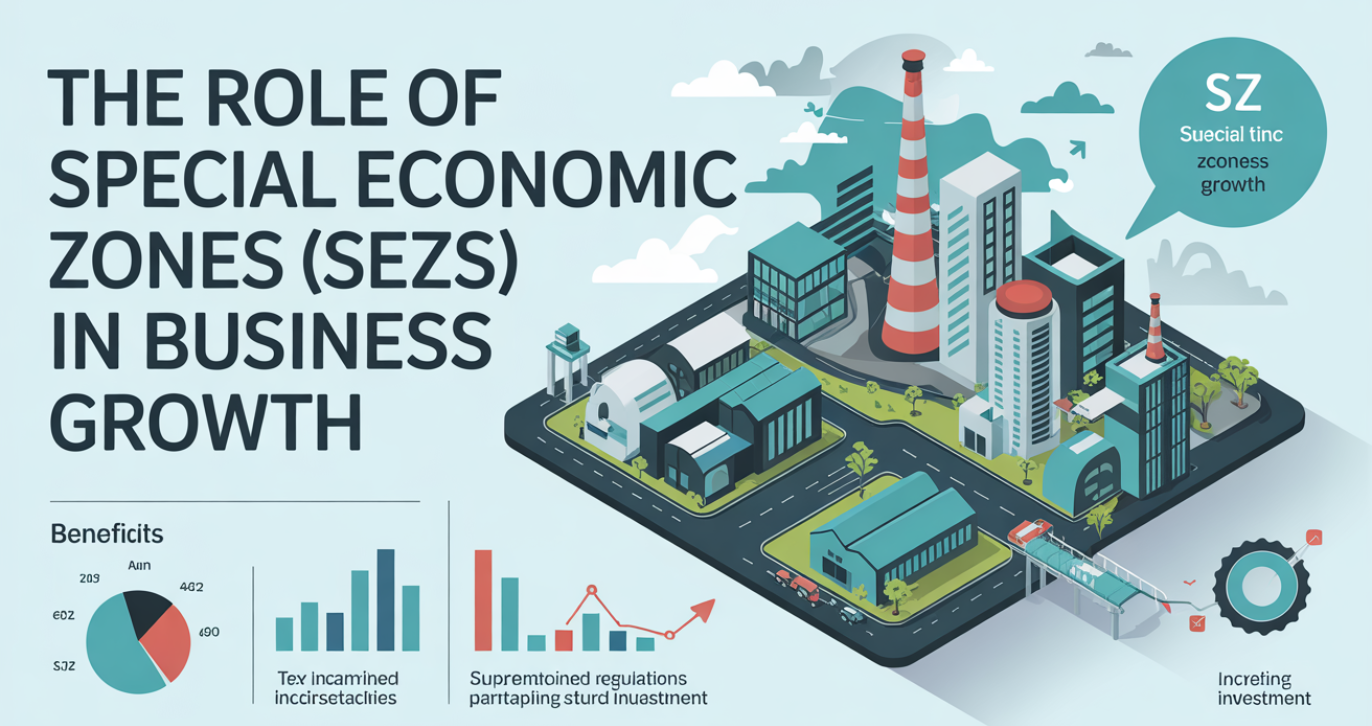The Special Economic Zones offer a business-friendly atmosphere that greatly contributes to economic growth. These areas are designated for tax incentives to attract domestic and foreign investment.s. Most governments implemented SEZ policies to embrace industrialization alongside export and job creation. The present article is on the importance of SEZs in business growth, benefits, challenges, and prospects.
Read our blogs: Top Industrial Policies for Emerging States that Enhance Manufacturing
Understanding SEZs
Special Economic Zones (SEZs) are specific areas in a country that have different rules for business than the rest of the country. They provide benefits like tax breaks, easier customs processes, and fewer regulations to encourage businesses. SEZs help attract investment and promote industrial growth and global trade. Special Economic Zones (SEZs) are specific areas in a country that have different rules for business than the rest of the country. They provide benefits like tax breaks, easier customs processes, and fewer regulations to encourage businesses. SEZs help attract investment and promote industrial growth and global trade. They are designed to facilitate business activities through the provision of tax exemptions, simplified customs procedures, and relaxed regulations. SEZs promote investment and thus act as a catalyst for industrialization and globalization.
Benefits of Special Economic Zones
Attracting Foreign Direct Investment (FDI) The SEZ provides a highly attractive investment climate to foreign investors like
- Enhances Export Performance
Many of the SEZs are export-oriented, industrially efficient logistics support. It gives businesses a stronger competitive edge with which to sell their products to foreign markets. SEZs dismantle all trade barriers to reach international markets much easily, thus enhancing national exports and reserves in foreign currencies.
- Job Creation and Economic Growth
Establishing SEZ creates employment opportunities directly and indirectly as industrial growth occurs and contributes to the economic development of regions. SEZs employ in areas such as manufacturing, logistics, administrative, and support services and, ultimately, uplift the local economies and communities.
- Technology and Skill Development
An SEZ is everywhere a knowledge hub, and multinationals collaborate with the local partner to transfer technology and develop skills through upgradation of the workforce. Establishments in SEZs bring with them advanced technologies, research initiatives, and specialized training programs to improve local talent and innovation for the future.
- Infrastructure and Urban Development
The sharp government investments into SEZ infrastructure are emblematic of the improved transport, utilities, and smart city thinking in governmental balance sheets. Development in SEZs almost always means better roads, ports, and air infrastructure, as well as digital networks for the benefit of businesses and the communities within which they are situated.
- Encouraging Small and Medium Enterprises (SMEs)
SEZs leave room for SMEs by providing them with world-class infrastructure, technology, and markets. Financial incentives, grants, and mentorship programs through which governments help small businesses grow and compete globally are provided by the majority of countries, aiding in a very consistent manner.
For more information: Business Ideas and Investments Opportunities
Challenges Facing SEZs
Regulatory and Bureaucratic Hurdles Even then, the complicated regulatory framework and administrative delays can deter investors from developing failing SEZs. Hence, governments need to ensure that the approve process to establish an SEZ is short as well as clearly defined.
- Land Acquisition Problems
Since the local communities and environmentalists are usually against allotting land for the development of the SEZ resort, both the government and the developers must implement fair compensation policies and sustain land use practices to avoid conflicts.
- Economic and Policy Instability
Such repeated policy introductions and economic downturns erode business confidence in investing in SEZs. Long-term economic planning and consistent policies are essential factors for creating investor trust and stability in SEZs.
- Competitive Threat from Other SEZs
Competition forces governments to keep upgrading their policies seeking attractiveness. Countries, hence, must keep innovating and differentiating their services through specialization in a niche industry, integration of technologies, and ease of doing business.
- Environmental Sustainability Concerns
Since the rapid industrialization in SEZs is not properly managed, it can lead to environmental degradation. Strict environmental regulations should be implemented, and eco-friendly forms of industrial practices, like renewable energy and waste management solutions, should be promoted by the government.
Read our blogs: Startup Support in West Bengal Boosts Manufacturing Growth
Case Examples:
Successful SEZ Models China
The SEZ Model China has fully turned SEZs into an engine of transformation of its economy. For instance, Shenzhen turned from a typical fishing village to a bustling global economic hub because of the SEZ policies that attracted massive foreign investments and the growth of industries.
India’s SEZ Policy
One of the main pillars supporting India’s export and employment growth is the SEZ program. The manufacturing clusters and IT parks found in the SEZs have encouraged international investment in sectors like electronics, textiles, and medicines.
Dubai Free Zones
Dubai’s SEZ countries such as Jebel Ali Free Zone allow 100 per cent foreign ownership, are income-tax free, and provide high-grade infrastructure facilities, thus becoming one of the world’s premier business hubs.
Closing Thoughts
SEZs work for business growth by providing an environment conducive to investment, industrialization, and exports. Mind you, they do possess challenges, yet they play a role in national economic development. Rather, with suitable policy frameworks, sustainable practices, and technologies, all these would further help ensure that SEZs will be a key player for countries in their global business outreach. Nations scoring by adapting SEZ strategies to the changing trends in the economies will be better off in the end regarding attracting investments and developing permanent economies.










